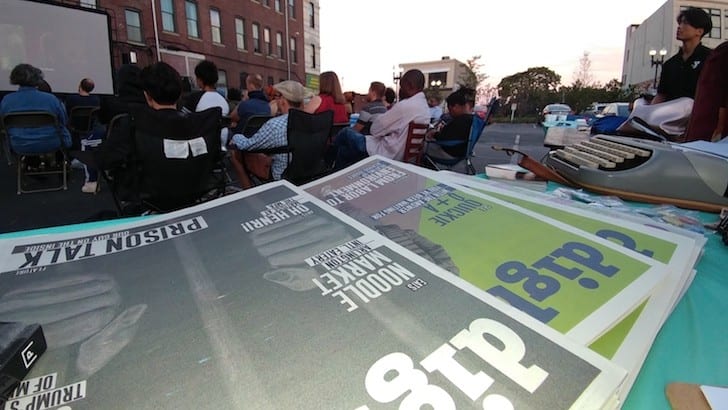DigBoston hosts the premiere indy newspaper convention at a difficult moment for journalism
Jason Pramas
A Home in the Digital World
independent
EDITORIAL: DONATE TO DIGBOSTON TODAY!
Without your help, we can’t serve democracy by reporting the news
THE YEAR IN DIGBOSTON

Let them call us rebels, and welcome…
December 27, 2017
BY JASON PRAMAS @JASONPRAMAS
If you had asked me 14 months ago if I thought that I’d have a shot at taking over the management of DigBoston with my partners Chris Faraone, John Loftus, and Marc Sneider, I would have said “nah.” Yet six months ago we did just that, after effectively running the paper for the previous six months. We now have a once-in-a-lifetime chance to publish the only remaining alt newsweekly in a major American city. In a difficult period when the fate of our democracy is at stake.
So my year in review piece has to be a look at what we’ve done with that chance—aside from completing the obvious task of producing 52 issues of hard-hitting locally focused journalism this year.
For starters, we know that DigBoston can only succeed as a collective effort. And as a first order of business, we set about contacting dozens of folks who had already worked with the paper in the past to tell them that we were ready to set Dig to rights, stabilize our operation, and begin expanding. These things we have done.
Second, we carried on the tradition we had from working on the nonprofit Boston Institute for Nonprofit Journalism of building alliances with other publications. Which is why you’ll note we’re running articles simultaneously with those allies on a regular basis. Journalism in the 21st century is not going to succeed with news outlets that view themselves as isolated islands. We believe the only way to move forward is to stop being territorial, build bridges of mutual aid and solidarity between like-minded media enterprises, and figure out ways to work more closely together over the long haul. The better to expand all of our reach and scope.
Third, we began recruiting new talent. We even put out a call for interested native working-class Bostonians to join our reporter pool—whether they are trained journalists or not—and will shortly begin training up untrained applicants who answered that first of what will be an ongoing series of calls. Because we do not think it’s possible to cover local news properly without fielding a solid number of journalists who were born and raised in and around Boston. And if there aren’t enough trained journalists that meet those criteria, then it’s our responsibility to teach them.
Fourth, we are not interested in the recent fad of “engagement” in journalism circles. It’s artificial and doomed to fail like all the other initiatives coming out of what some correctly dub the “foundation-industrial complex” and the academic centers it lavishes money on apropos of nothing. We are part of the communities we cover and believe that we cannot be good journalists if we’re not in constant communication with those communities. So you’ll see us at more and more public events, and notice us cooking up different schemes to be helpful to our audience in more concrete ways with every passing month. Such practices also have the salutary effect of helping us meet more talented folks from all over the city. Ensuring that our organization becomes more and more diverse by every metric—a specific goal of ours—organically over time, rather than in some forced, scripted, and ultimately ineffective fashion cribbed from the pages of some disingenuous HR manual somewhere. As with certain governments and corporations we could (and often do) name.
Fifth, we are pioneering a hybrid news model linking our nonprofit and for-profit wings that is helping us solve the difficult problem of how smaller community news outlets like DigBoston can afford to produce expensive but vitally important investigative news reporting. With more punch and élan than the remaining major news outlets are generally capable of in this era. Our concept is straightforward. We simply continue to run the aforementioned Boston Institute for Nonprofit Journalism that we launched two years prior to taking over this newspaper—raising donations to pay directly to our growing army of highly experienced talent to produce long-form investigative features and series. And publish them in DigBoston, which couldn’t pay for as much journalism without that arrangement. BINJ syndicates those stories free of charge to other news outlets in our network. We’re also working to spread this hybrid model around the country. In the interest of doing our bit to stop and ultimately reverse the rolling collapse of the American news industry… due in part to lack of ready money for news production.
Sixth, we remain fiercely independent. We are not beholden to the powerful interests that appear to be doing their best to run American democracy into the ground. And we don’t think it’s possible for honest journalists to approach our work in any other way.
Seventh, we continue the alternative journalism tradition of seeking to be fair and accurate in all our reporting. But we join other American alt weeklies in criticizing “objectivity”—the idea that journalists can somehow remove our opinions, and therefore ourselves, from our articles. Because we don’t believe that it’s possible or desirable to do so.
Finally, I think we’re doing our best to run DigBoston like a big, riotous, but deeply caring family. My partners and I certainly wouldn’t have it any other way, but neither would the incredibly talented staff we’re assembling from all walks of Boston area life. And it is they who make this whole mad, yet utterly necessary enterprise in the service of a democratic society possible. So here’s to them! And here’s to DigBoston! And here’s wishing all of our growing crew—and all of you—a very happy new year! Up the rebels!
Jason Pramas is executive editor and associate publisher of DigBoston.